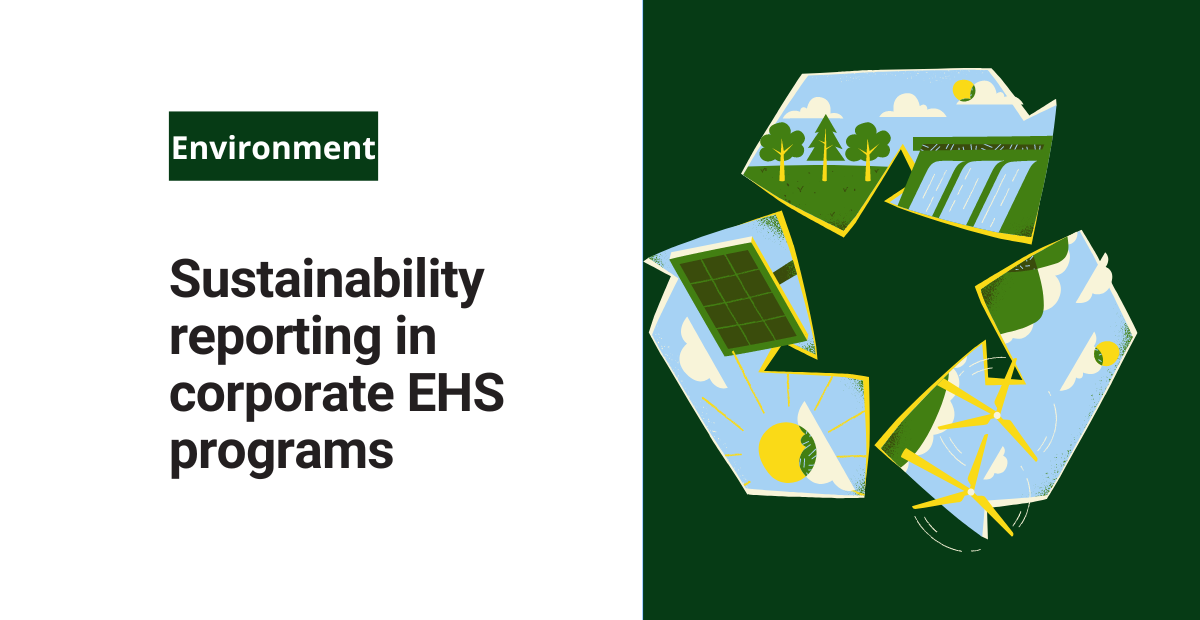As environmental concerns continue to grow, more companies are focusing on their performance within the area of sustainability. EHS programs, for their part, aim to manage and mitigate the environmental risks that come with daily operations.
However, it’s not enough to simply implement an EHS program.
You must also report on your sustainability initiatives as a means of demonstrating your commitment to environmental responsibility. In tandem with well-established EHS programs, sustainability reporting can benefit both your business and the environment.
What is sustainability reporting?
Sustainability reporting is the process of publicly disclosing your company’s environmental, social, and governance (ESG) performance. This report can take various forms, including:
- Annual overview of company performance in all areas
- A dedicated sustainability report
- Standalone ESG report
This document typically includes information on your company’s environmental impact, its social practices, and its corporate governance structure.
Why is sustainability reporting important?
Transparency on environmental initiatives is important because it:
- Builds trust with customers, investors, and regulatory agencies
- Enables your to benchmark your performance against industry peers
- Helps push the needle towards improved sustainability practices within an industry
- Provides an opportunity for you to find process improvement opportunities
Let’s look at these benefits in more depth.
What are the major benefits?
Below are some of the key benefits that sustainability reporting provides for both companies and the environment.
Increased transparency
Sustainability reporting promotes transparency and accountability, which helps to build trust with stakeholders. By disclosing their ESG performance, companies can demonstrate their commitment to responsible environmental management and build stronger relationships with customers, investors, and other stakeholders.
Improved reputation
Good environmental performance is a major draw for new employees who want to work for conscientious brands. Likewise, prospective clients and partners may feel better about working with a company that values sustainability and has evidence to back it up.
Regular sustainability reports help to highlight these qualities for anyone thinking about aligning with your brand.
Better risk management
Sustainability reporting can also help you identify and manage environmental risks associated with your operations. By monitoring and reporting on your environmental impact, you can identify areas of improvement or places to mitigate potential environmental risks.
Improved decision-making
You may also find that the data you collect for your reports offers a valuable internal audit of your existing systems. It can help you make better decisions about resource allocation, product development, and other business operations.
Positive environmental impact
Perhaps the most obvious but often overlooked benefit of publishing sustainability reports is that it may help you reduce your environmental impact and contribute to a more sustainable future.
This, of course, is only true if you’re compiling the reports with every intention of acting on your findings.
What is the biggest mistake to avoid?
The biggest mistake you can make in regard to sustainability reporting is to publish information that’s not reflective of your environmental performance. If you complete your analysis and find that you don’t want to publish the true findings, that’s probably because you have a lot of room for improvement.
A false assumption to make is that reporting your failures as a company is a sure way to put off potential customers or workers. It’s all about how you frame it.
Use your report as an opportunity to demonstrate what areas you want to focus on and how you plan to improve them. Of course, you don’t want to paint yourself in a negative light. But if you’re going to publish your sustainability reports publicly, you should be prepared to back up the claims you make.
Many companies focus on maximizing shareholder value at all costs—even if it has a negative impact on the environment. But this line of thinking is shifting, especially given increasing demand from consumers for great transparency. The long-term play is to be transparent about your environmental footprint and how you’re addressing sustainability concerns moving forward.
Other posts you might like…
No posts
